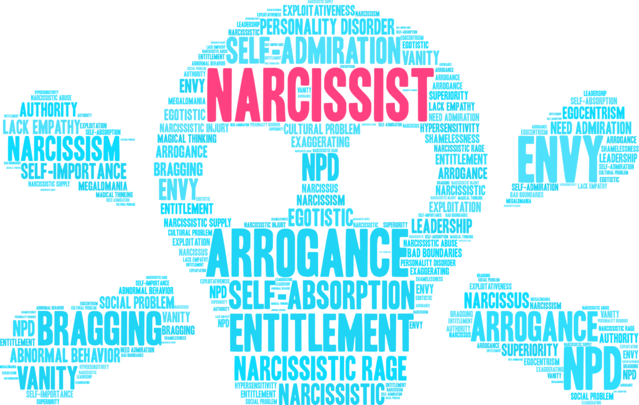Narcissism is a personality disorder that generally includes an inflated sense of self-importance, preoccupation with fantasies of unlimited success or brilliance, and an excessive need for admiration. Narcissists typically do not recognize such feelings as abnormal but instead attribute all setbacks to external sources. In this article, we will discuss the meaning of narcissist and how it is defined in psychology, and what causes them to behave in this manner.
Contents
Meaning Of Narcissist
 Narcissism is a personality disorder that is characterized by an inflated sense of self-importance, preoccupation with fantasies of unlimited success or brilliance, and an excessive need for admiration. Narcissists typically do not recognize such feelings as abnormal but instead attribute all setbacks to external sources.
Narcissism is a personality disorder that is characterized by an inflated sense of self-importance, preoccupation with fantasies of unlimited success or brilliance, and an excessive need for admiration. Narcissists typically do not recognize such feelings as abnormal but instead attribute all setbacks to external sources.
Signs of narcissism can include grandiose thoughts and behavior, exhibitionism, need for constant validation, and lack of empathy. Treatment for narcissism generally includes psychotherapy and medication. Prevention of narcissism can include therapy for parents who are overly indulgent or critical of their children. Ways to deal with a person who has a narcissistic personality disorder can include setting boundaries, being assertive, and getting professional help.
Meaning Of Narcissist Personality Disorder
A narcissist personality disorder is a mental disorder in which a person has an inflated sense of self-importance and a deep need for admiration. People with a narcissistic personality disorder often have a hard time accepting criticism and can be very sensitive to any perceived insults or slights. Narcissists may also be prone to bouts of rage and manipulation.
A narcissistic personality disorder is often diagnosed in the teen or early adult years. This can make it even more difficult for a teen to cope with this disorder, as they are already struggling to fit in and live up to parental expectations. It’s important that parents encourage an open relationship with their teen and keep communication lines open at all times; teens who may be suffering from a narcissistic personality disorder may be best able to confide in someone outside of the home. While some teens are able to overcome narcissistic personality disorder by themselves, others require treatment before they are able to successfully interact with others.
Symptoms of Narcissism
The symptoms of narcissism vary depending on the individual person but may include:

- Inflated sense of importance
- Need to be admired
- Sense of entitlement
- Exploiting others for personal gain
- Trouble keeping healthy relationships
- Difficulties from being criticized
- Believing that others are envious of them
- Possessing a fragile self-esteem
Causes
The exact cause of narcissistic personality disorder is not currently known, but the problem appears to stem from a combination of factors. These may include:
Genetics – Some types of narcissism may run in families.
Cultural influences – People tend to aspire to the standards set by those around them.
Childhood experiences – Abusive or neglectful treatment as a child can lead people to feel insecure about themselves and become overly dependent on other people’s approval.
Types Of Narcissist
There are three main types of narcissists: overt, covert, and vulnerable narcissists.
The overt narcissist is someone who is very easy to spot. They have an inflated sense of self-importance and think they’re better than everyone else. They often make themselves the center of attention and can be very manipulative.
The covert narcissist is much harder to spot. They often have very fragile self-esteem and will go to great lengths to cover up any feelings of inadequacy. They often act out in passive-aggressive ways and can be very vengeful.
The vulnerable narcissist is the most common type. They have a lot of the same traits as overt and covert narcissists, but they’re less manipulative and not as outwardly confident. They also tend to avoid the spotlight.
The three types of narcissists have a few things in common: they all have an inflated sense of self-importance, they all lack empathy for others, and they will do whatever it takes to get what they want. These personality disorders are considered difficult to treat and often lead to relationship problems both at home and in the workplace.
Treatment Of Narcissism

Treatment for narcissistic personality disorder typically involves a combination of counseling and medication. Long-term therapy can help patients learn more constructive ways of interacting with others, reducing their feelings of entitlement, and improving coping skills. In some cases, counseling may help a patient uncover deeper mental health concerns that may be contributing to narcissistic personality disorder symptoms.
Patients who suffer from this disorder often have unrealistic expectations of those around them and may lash out when they feel “threatened” by someone else’s accomplishments or happiness. Early diagnosis is key in treating this disorder, as it can contribute greatly to problems at home and school. Developmental delays and academic issues can plague children suffering from NPD; early treatment may prevent these setbacks later on in life.
Psychotherapy
The treatment for narcissism can vary depending on the individual person, but usually includes psychotherapy and medication. Psychotherapy often involves working with a therapist to address underlying issues of low self-esteem and an unhealthy need for approval. Therapy may also help a person learn better communication skills and how to resolve conflicts in healthy ways. Some people may benefit from group or family therapy sessions, which can further teach positive coping skills while allowing loved ones to express their concerns more freely.
Medications
Medications used to treat narcissistic personality disorder typically include antidepressants or anti-anxiety drugs. These medications can help reduce depressive symptoms while relieving some of the stress and anxiety associated with this disorder.
Preventions Of Narcissism

There is no surefire way to prevent narcissistic personality disorder, but early intervention can help a child struggling with the disorder. It’s important for parents to be aware of the symptoms and meaning of narcissism and to seek professional help if they feel that their child may be affected. Treatment typically involves a combination of counseling and medication and can help a child learn more constructive ways of interacting with others, reducing their feelings of entitlement, and improving coping skills.
Prevention of narcissism can include therapy for parents who are overly indulgent or critical of their children. Parents should remember that sometimes it is appropriate to set limits and hold teens accountable for their actions. People may be more prone to narcissistic personality disorder if their parents were too permissive or controlling. It’s also important for individuals to seek treatment if they feel overwhelmed by feelings. Such as rage, self-loathing, and the inability to handle criticism in healthy ways.
Ways To Deal With Narcissism

If you’re dealing with a narcissist, there are a few things you can do to protect yourself:
1. Don’t take their insults and criticisms to heart – narcissists are often very sensitive to any perceived insults or slights and will often react with rage or manipulation.
2. Set healthy boundaries – narcissists often have a hard time accepting criticism and may try to exploit others for personal gain. It’s important to set healthy boundaries and let the narcissist know that you will not tolerate mistreatment.
3. Don’t enable their behavior – if you allow the narcissist to walk all over you, they will only become more abusive and manipulative. Stand up for yourself and don’t let them take advantage of you.
4. Focus on your own personal well-being – in order to protect yourself from the narcissist. It’s important to take care of your own needs and happiness. This may mean spending less time around the narcissist or setting firm boundaries. That lets them know what actions are acceptable and which ones aren’t.
Narcissism is a personality disorder that causes people to act with an inflated sense of their own importance and a deep need for admiration. People with this disorder believe themselves to be superior to others and have little regard for other people’s feelings. However, behind this mask of ultra confidence lies a fragile self-esteem, vulnerable to the slightest criticism.
This sense of vulnerability may cause narcissistic people (also called narcissists) to constantly seek out validation from others. When they feel that they’re being rejected – either overtly or covertly – the narcissist will often respond with aggression, criticism, or stinging remarks designed to diminish the other person’s opinion of themselves. This intense need for attention and approval makes a narcissistic personality both fragile and destructive.
How To Help Someone Who Is Dealing With A Narcissist?

If someone you care about is dealing with a narcissist, there are ways you can help. First, it’s important to understand what a narcissist is. Tell them the meaning of narcissist. A narcissist is someone who has an inflated sense of self-importance and a lack of empathy for others. They often use manipulation and coercion to get what they want.
Educate Yourself
If someone you care about is dealing with a narcissist. The first thing you should do is try to educate yourself on the topic. You can find books, articles, and even online resources. That can help you learn more about how to deal with this type of personality disorder. You can also find support groups for people who have loved ones with narcissism.
Communicate
It’s also important to keep the lines of communication open. The narcissist in your life may not be willing to admit that there is a problem or seek out help for it. But that doesn’t mean you can’t talk about the issue yourself. Be honest with them about how difficult their behavior is making things for you and ask what you can do to help.
Honor Boundaries
You should also recognize when boundaries need to be set. It’s crucial not to enable the person if they are unwilling or unable to get treatment, as this could make things worse in the long run. If the person refuses professional help, support groups might provide other forms of support throughout this tough time.
If someone you care about is dealing with a narcissist, then these may be able to help them out. Educate yourself on the topic and do what you can to support them through this difficult time. If they are unwilling or unable to get help, it’s important not to enable their behavior.
If you believe in your heart that someone close to you is suffering from a narcissistic personality disorder, act now. Contact us today for more information about how our treatment programs can help. We work with only the best facilities in the country when it comes to addiction treatment. And we’ll be happy to put you in touch with one near you today.
Conclusion
Most people have a little bit of narcissism in them. It is natural to want some attention and be recognized for your accomplishments. Even if it might seem excessive at times. However, when someone is narcissistic they often feel entitled to special treatment. Because they think that everything should revolve around them. That is why it is important to understand the meaning of narcissist. These individuals also tend to lack empathy and always need the spotlight on themselves whether it’s their achievements or money problems.
If you are looking for affordable Online Counseling MantraCare can help: Book a trial therapy session


